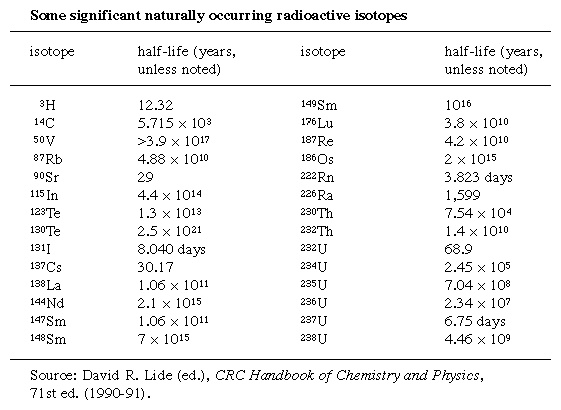radioactive isotope
chemistry
also called radioisotope
 any of several species of the same chemical element with different masses whose nuclei are unstable and dissipate excess energy by spontaneously emitting radiation in the form of alpha, beta, and gamma rays.
any of several species of the same chemical element with different masses whose nuclei are unstable and dissipate excess energy by spontaneously emitting radiation in the form of alpha, beta, and gamma rays.A brief treatment of radioactive isotopes follows. For full treatment, see isotope: Radioactive isotopes (isotope).
Every chemical element has one or more radioactive isotopes. For example, hydrogen, the lightest element, has three isotopes with mass numbers 1, 2, and 3. Only hydrogen-3 ( tritium), however, is a radioactive isotope, the other two being stable. More than 1,000 radioactive isotopes of the various elements are known. Approximately 50 of these are found in nature; the rest are produced artificially as the direct products of nuclear reactions or indirectly as the radioactive descendants of these products.
Radioactive nuclides, or radionuclides, are species of unstable atomic nuclei without the restriction of being forms of the same element. Radioactive nuclides consist of all the sets of radioactive isotopes.
Radioactive isotopes have many useful applications. In medicine, for example, cobalt-60 is extensively employed as a radiation source to arrest the development of cancer. Other radioactive isotopes are utilized as tracers for diagnostic purposes, as well as in research on metabolic processes. When a radioactive isotope is added in small amounts to comparatively large quantities of the stable element, it behaves exactly the same as the ordinary isotope chemically; it can, however, be traced with a Geiger counter or other detection device. Iodine-131 has proved effective in locating brain tumours, measuring cardiac output, and determining liver and thyroid activity. Another medically important radioactive isotope is carbon-14, which is useful in studying abnormalities of metabolism that underlie diabetes, gout, anemia, and acromegaly.
In industry, radioactive isotopes of various kinds are used for measuring the thickness of metal or plastic sheets; their precise thickness is indicated by the strength of the radiations that penetrate the material being inspected. They also may be employed in place of large X-ray machines to examine manufactured metal parts for structural defects. Other significant applications include the use of radioactive isotopes as compact sources of electrical power (electric power)—e.g., plutonium-238 in cardiac pacemakers and spacecraft. In such cases, the heat produced in the decay of the radioactive isotope is converted into electricity by means of thermoelectric junction circuits or related devices.
- opalinid
- Opaliński, Krzysztof
- Oparin, Aleksandr
- Op art
- Opatija
- Opava
- OPEC
- Opel AG
- Opel, Fritz von
- Opelika
- Opelousas
- opencast mining
- open cluster
- Open Door policy
- open-field system
- open-hearth process
- open-heart surgery
- open-market operation
- open-pit mining
- Open Range
- open source
- open stage
- Open University
- opera
- opera buffa